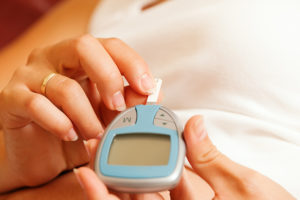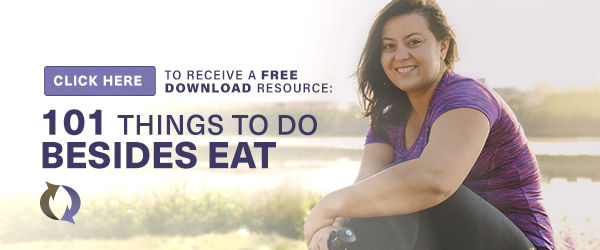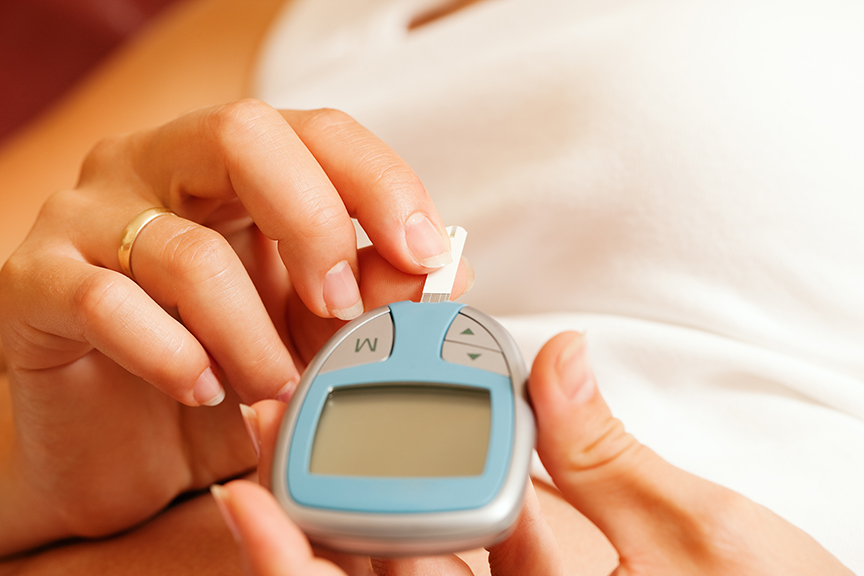By Megrette Fletcher, M.Ed., R.D., CDCES and Michelle May, M.D.
Learning about using hunger to recognize hypoglycemia when you are on medications for diabetes is one of the ways mindful eating helps you. This article will help you use mindful eating to recognize hunger and hypoglycemia on diabetes medication
The purpose of mindful eating is to become aware of your own personal experience. Tuning into your body, noticing how it changes, learning how hunger feels, and becoming aware of which foods satisfy your hunger best are all part of mindful eating. You can build on this awareness by recognizing changes in your blood sugar, learning how your diabetes medications can influence your blood sugars, and becoming more attuned to what that feels like.
Preventing a problem like hypoglycemia, rather than just treating it, is another important way that mindful eating can help improve your management of your diabetes.
What is the difference between hunger and hypoglycemia?
 Hunger is often the first symptom of a decrease in your blood sugar. It is simply your body’s way of telling you that you need fuel.
Hunger is often the first symptom of a decrease in your blood sugar. It is simply your body’s way of telling you that you need fuel.
If you’re not able to identify hunger, you may also have difficulty identifying low blood sugar (hypoglycemia).
It is important to know that having diabetes does not cause hypoglycemia. However, some of the medications used to treat diabetes can cause low blood sugars. Examples of these medications include insulin, glyburide, glipizide, Amaryl, Starlix, Prandin, or combination medications such as Metaglip.
Hypoglycemia is defined as a blood sugar of less than 70 with or without symptoms, or a blood sugar of 80 or less with symptoms.
If your blood sugar is below 70, you need to treat it immediately. Consume carbohydrate (usually 15 grams, for example, 4 ounces of juice or soda or 6 saltine crackers) as advised by your health care provider. (If unable to consume carbohydrate by mouth, call 911 immediately.)
Low blood sugars may occur between meals, with meal skipping, after activity, or when your diabetes medication peaks. Diabetes medications are an important part of treatment. Work with your health care provider to make adjustments to your medications and lifestyle if you are experiencing hypoglycemia.
Symptoms of hypoglycemia (low blood sugar)
The symptoms of hypoglycemia can vary and may include:
- Hunger
- Difficulty concentrating
- Headache
- Shaking
- Irritability/anger
- Sweats
- Dizziness
- Anxiety
- Confusion
- Unconsciousness.
Hunger and hypoglycemia on diabetes medication
Mindful eating can help you learn to identify hunger and hypoglycemia on diabetes medication. This is important because, depending on the severity, hypoglycemia must be paid attention to:
- Early symptoms of low blood sugar simply indicate that it is time to eat.
- Mild symptoms can make it difficult to continue your current activity and live your life fully because you feel poorly.
- Severe hypoglycemia can become very serious and must be recognized and treated.
If you’re on medications that cause hypoglycemia, then repeated episodes can blunt the symptoms of low blood sugar, making it even harder to recognize them. As a result, the severity of the hypoglycemia worsens over time.
If you are not able to feel a low blood sugar before it “hits,” it is called hypoglycemia unawareness. Mindfulness and mindful eating can help you manage your diabetes by helping you become aware of these symptoms sooner, alerting you to a possible problem.
Steps to notice what your blood sugar feels like
Become curious. Check in and ask yourself, “Do I feel any different when my blood sugar is below target? Are there any signs or clues that my blood sugar is low or dropping?”
Observe for specific symptoms of low blood sugar. Common symptoms include hunger, shaking, sweats, difficulty concentrating, confusion, irritability/anger, or anxiety.
Test your blood sugar. Since no two people experience low blood sugar the same way, test your blood sugar more often for a week or two. Check it at various times and when you suspect it might be low.
Talk with your healthcare professional. Find out whether you are taking a medication that could cause a low blood sugar. If you are, ask your doctor, “Does this medication have a peak or a time when I should check my blood sugar?”
Record your blood sugars and look for patterns. Did your reading make sense to you? Did you think, “Wow! I didn’t think it would be that!” Take a moment to write the reason you think your blood sugar was low (or high) in your blood sugar log,including information about when, what, and how much you ate, and details about your physical activity prior to the episode. A quick note is better than relying on your memory.
Always take your detailed blood sugar log with you to your appointments. This will help you have more effective conversations with your healthcare team because it you are able to show them how your diabetes treatments-diet, activity, and medications-are working.
Contact your healthcare provider if you have had two or more low blood sugars in a week. If you are experiencing low blood sugars, review your diabetes medications, diet, and physical activity patterns with your health care provider. The goal of diabetes self-management is to improve your health. Mindful eating helps by increasing your awareness so you can play an active role in your healthcare.
If you enjoyed this article, here are three more to help you:
There is No Such Thing as a Perfect Blood Sugar
I have diabetes and I’m afraid to eat carbs
Do I have to eat three meals a day with diabetes?



6 thoughts on “Mindful eating, hunger and hypoglycemia on diabetes medication”
You have some very good information here. I have 2 people in my family with diabettes and am always trying to find usefull informaton for them. They will for sure get this article. Thanks and keep up the good work.
When I have low blood sugar, I feel sick to my stomach. I know I need to eat, but feel almost like I have morning sickness rather than any kind of hunger. It is like it has gone way beyond the hunger point & then goes to this sick feeling with shakiness, difficulty thinking, anxiety, sweating & chills & feeling faint.
I seem to have problems w/blood sugar going too low in the morning when I have overeaten the night before (plan to practice mindfulness eating skills to avoid overeating) or when doing intense aerobic exercise.
When I was first diagnosed at 18, I lost weight on the exchange diet & then started having reactions to the medication making my blood sugar going too low.
S.G., mindfulness will also help you become more aware of hunger symptoms before you get to such a low point. Since you are already aware of certain situations that make you more prone, you may decide to observe yourself closely to see if there are more subtle symptoms that you have been missing until they become more obvious and uncomfortable. Checking your blood sugar to correlate it with your signals may also be helpful.
Comments are closed.